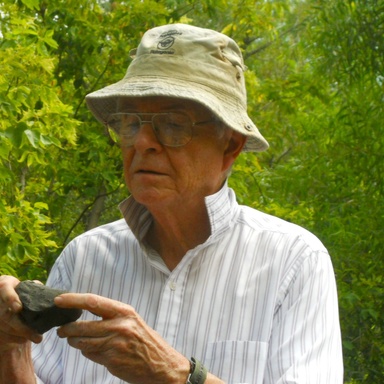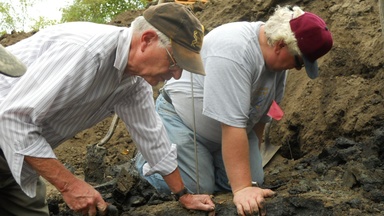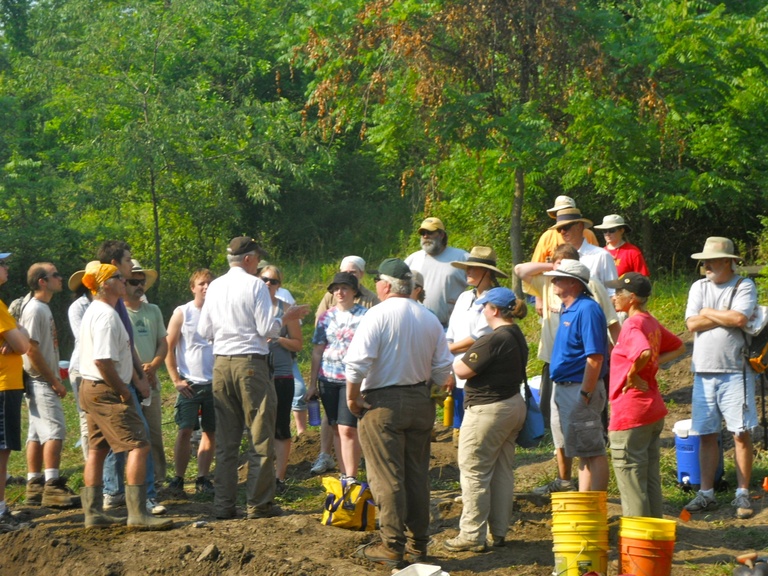Holmes A. Semken, Jr., Professor Emeritus, and vertebrate paleontologist, died on January 1, 2024, age 89.

Semken was born in Knoxville, Tennessee and spent much of his childhood living in Maryville, Tennessee, Hot Springs, Arkansas, and Rockdale, Texas. After graduating from Rockdale High School, he participated in a summer archaeological field trip which led to him being offered a job at the Texas Memorial Museum in Austin. Here, Semken performed a variety of occupations from serving as a night guard, to traveling to New Mexico to collect bison bones, sparking an interest in vertebrate osteology and paleontology.
Semken completed BS and MS degrees in geology at the University of Texas-Austin, graduating in 1960. From 1961 to 1962, Semken worked for The Smithsonian at a site outside of Littleton, Colorado where parts of twenty-one Columbian mammoths (Mammuthus columbi) were uncovered.
Semken graduated with a Ph.D. in geology from the University of Michigan, Ann Arbor, in 1965 (“Stratigraphy and paleontology of the McPherson Equus beds (Sandahl local fauna), McPherson County, Kansas”) and was immediately hired as an Assistant Professor at the University of Iowa, becoming Associate Professor in 1969, and Professor in 1973. He served as chair of the University of Iowa Department of Geology from 1986-1992 and retired to Professor Emeritus in 1999.
Semken's research interests focused on the taphonomy and zooarchaeology of micromammals, but also included the larger topics of paleoecology, biogeography, and evolution. His research has also examined the extinction of Pleistocene vertebrates and Holocene vertebrate biogeography. Much of Semken's work has focused on the Wisconsin-Holocene extinction event and micromammals in the Holocene in the Northern Great Plains. Throughout his career, Semken conducted field research in Iowa, Missouri, Texas, and Arkansas. He published over 50 papers, plus site reports, and several book reviews.

Semken was an expert on Quaternary mammals. He was noted for his work on the relationship between mammals and climate change in the Midwest, and he contributed to landmark collaborative projects documenting long-term changes in mammal diversity from the beginning of the Pleistocene through the present. Along with Drs Lon Drake and Dick Baker, he formed the core of a research group focused on Quaternary paleoenvironments in the region. Semken built a world-class collection of Quaternary micromammals in the UI Paleontology Repository, comprising more than 60,000 specimens from over 50 paleontological and archaeological sites in Iowa and the Midwest. The material was collected primarily by Semken’s graduate students and served as the basis for at least 20 theses and dissertations. The collection contributes to the documentation of the Late Quaternary distribution of mammalian species in the U.S. via FAUNMAP and currently the Neotoma Paleoecology Database.
Semken’s most recent major project was an extensive study of extinct giant ground sloths from the Tarkio site in western Iowa, published in the Journal of Vertebrate Paleontology last year. The paper exemplifies the interdisciplinary nature of his work as well as the clarity of his writing and both the breadth and depth of his expertise.
Semken was a Fellow of both the Geological Society of America and the Iowa Academy of Science, a member of the Paleontological Society, Society of Vertebrate Paleontology, American Society of Mammalogists, International Union for Quaternary Research, American Quaternary Association, and the American Geological Institute. He was also a member of the Plains Anthropological Society, Society of American Archaeologists. Being a life-long spelunker, he was also a member of the National Speleological Society. Throughout his career, Semken received awards and recognitions, including memberships in the honors societies Sigma Xi and Sigma Gamma Epsilon, inclusion in Who's Who, American Men & Women of Science, and was a delegate to the Peoples Republic of China for the Society of Vertebrate Paleontology's scientific exchange.
Semken was a model educator. At the University of Iowa, Semken mentored over 35 graduate students, often filling the building with the smell of boiling roadkill as they developed an extensive comparative mammal collection. Semken made a lasting contribution to UI and the Iowa City community through his work on the University of Iowa Museum of Natural History’s (UIMNH) “Iowa Hall” development team, creating the impressive exhibit of Iowa’s geological story and introducing “Rusty” the Museum’s charismatic and beloved life-size giant ground sloth model in 1985. He continued to be generous with his expertise long after his retirement both to professionals and the public and engaged hundreds of Iowans in outreach and excavation of the Tarkio sloths in partnership with the UIMNH and colleagues Sarah Horgen and David Brenzel. He enjoyed many friendships with local Ice Age mammal enthusiasts, particularly “Farmer John,” discoverer of the Mahaska County mammoths.
Semken had a good sense of humor and an easy nature and was uncommonly decent and kind. He and Elaine, his University of Texas sweetheart and loyal, supportive wife of over sixty years, hosted many geology faculty and students from all over the world at their Iowa City home, and travelled extensively (and geologically) together. Semken continued his research even as full-time carer for Elaine until she passed away in 2019.
The department and institution are diminished for his departure. For his mentorship and leadership, and lasting research legacy, we all stand grateful.

A time of visitation for family and friends will be held from 4 to 7pm Thursday, January 11, 2024, at Gay & Ciha Funeral and Cremation Service. Private family graveside services will be held at Oakland Cemetery. In lieu of flowers memorial donations can be made in his memory to either University of Iowa Museum of Natural History, mnh.uiowa.edu/support/make-donation,11 Macbride Hall, Iowa City, Iowa 52242 or American Battlefield Trust, battlefields.org/give, 1156 15th Street NW, Suite 900, Washington, DC 20005.